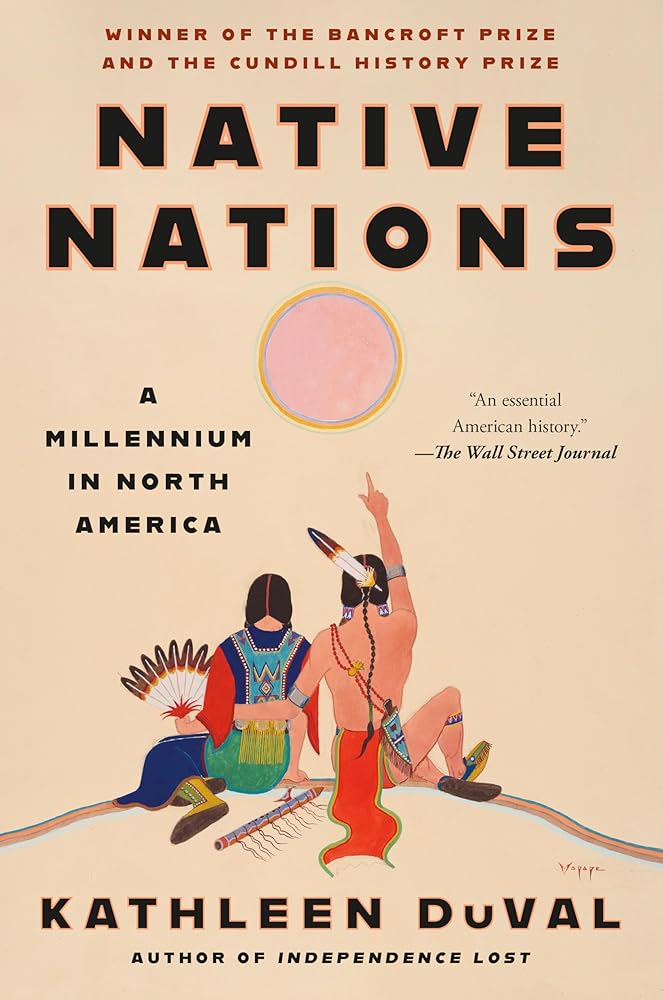Native Nations: A Millennium in North America
$25.00
Unit price / per“A magisterial overview of a thousand years of Native American history” (The New York Review of Books), from the rise of ancient cities more than a thousand years ago to fights for sovereignty that continue today
WINNER OF THE BANCROFT PRIZE, THE CUNDILL HISTORY PRIZE, AND THE MARK LYNTON HISTORY PRIZE
Long before the colonization of North America, Indigenous Americans built diverse civilizations and adapted to a changing world in ways that reverberated globally. And, as award-winning historian Kathleen DuVal vividly recounts, when Europeans did arrive, no civilization came to a halt because of a few wandering explorers, even when the strangers came well armed.
A millennium ago, North American cities rivaled urban centers around the world in size. Then, following a period of climate change and instability, numerous smaller nations emerged, moving away from rather than toward urbanization. From this urban past, egalitarian government structures, diplomacy, and complex economies spread across North America. So, when Europeans showed up in the sixteenth century, they encountered societies they did not understand—those having developed differently from their own—and whose power they often underestimated.
For centuries afterward, Indigenous people maintained an upper hand and used Europeans in pursuit of their own interests. In Native Nations, we see how Mohawks closely controlled trade with the Dutch—and influenced global markets—and how Quapaws manipulated French colonists. Power dynamics shifted after the American Revolution, but Indigenous people continued to command much of the continent’s land and resources. Shawnee brothers Tecumseh and Tenskwatawa forged new alliances and encouraged a controversial new definition of Native identity to attempt to wall off U.S. ambitions. The Cherokees created institutions to assert their sovereignty on the global stage, and the Kiowas used their power in the west to regulate the passage of white settlers across their territory.
In this important addition to the growing tradition of North American history centered on Indigenous nations, Kathleen DuVal shows how the definitions of power and means of exerting it shifted over time, but the sovereignty and influence of Native peoples remained a constant—and will continue far into the future.
“An essential American history”—The Wall Street Journal
Share
Sign up for our newsletter
Keep up with what's going on at Queer Haven Books for exclusive deals, news, and offers.
ABOUT
South Carolina’s only independent, queer bookstore. Shop Queer Haven Books for books, sit down with a cup of coffee, read a queer book, play a queer game, and build a queer community.
1332 Main Street, Unit #120
Columbia, South Carolina 29201
803-500-9543
queerhavenbooks@gmail.com
South Carolina’s only independent, queer bookstore. Shop Queer Haven Books for books, sit down with a cup of coffee, read a queer book, play a queer game, and build a queer community.
1332 Main Street, Unit #120
Columbia, South Carolina 29201
803-500-9543
queerhavenbooks@gmail.com
HOURS
Monday-Tuesday Closed
Wednesday 11am-8pm
Thursday 11am-8pm
Friday 11am-8pm
Saturday 9am-6pm
Sunday 10am-3pm
Monday-Tuesday Closed
Wednesday 11am-8pm
Thursday 11am-8pm
Friday 11am-8pm
Saturday 9am-6pm
Sunday 10am-3pm

